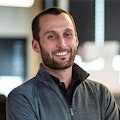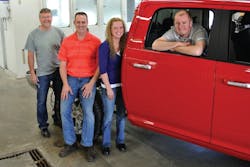Greg Slack was starting to think about his “outs.”
He holds degrees in aquatic biology and chemistry. He’s good with numbers and accounting. And for nearly 15 years, he’s had the experience of running a small business.
“I started thinking, ‘There must be something better than what I’m doing,’” he says.
What he was doing was managing Collision Specialists, the two-location collision repair business his father founded in 1967 in rural, southwestern Wisconsin.
And the shops were failing.
Collision Specialists had been stuck on the same revenue levels for nearly 10 years, while the costs of doing business steadily climbed. It was no longer profitable, and the younger of the two locations was bleeding the other dry.
Slack couldn’t figure it out. No matter how many hours he put into the business, he couldn’t generate any growth.
“Every year, I was making less money and working more hours,” he says. “Something had to change.”
The Backstory
Slack’s father, Jack, founded Collision Specialists (originally called Livingston Auto Body) in 1967 in Livingston, Wis. He ran the shop successfully for 30 years before opening the second location in Fennimore, Wis.
Slack, who worked off and on in the shop and the office throughout high school, came back to work in the family business after college, and helped his father with the expansion, becoming a partner in the new facility.
Between the two shops, business was steady, albeit not spectacular. The original shop made up the majority of the business’s roughly $750,000 in sales each year.
“It was a good start, and we felt good about it,” Slack says. “And that’s around the time my father stepped away from really running the shop day-to-day, and I took on more of a role.”
The Problem
Slack had ambitions of growing the shops’ revenue and he and his father even hoped to open a third location in the near future.
With Slack at the helm and working day-to-day at the front counter of the Livingston location, the shops had a promising revenue boost in 2001, a record year of $830,000 in total sales.
“And we were excited, but looking back, it was probably a bit of a fluke,” Slack says. “It was a harsh winter with early snow, a big hailstorm, and there were a lot of deer that year.”
Focus on Efficiency,
Not Sales
John Shoemaker, collision center director, Bodwitch Collision Center
While it is important to look at sales numbers, it is just as important to look at shop efficiency to maintain shop profitability. Sales numbers are calculated after the repair is finished and does not account for the expense of getting the repair accomplished. Greg instituted some great processes once business improved; however, those processes could have helped his business in the slow times as well.
Sales dropped right back down to that $750,000 mark the next year—and they stayed that way year after year while the cost of doing business kept rising. The business was progressively less profitable, and the prospect of providing for Slack’s wife and kids was looking more daunting with the passing of each long work day.
The problem was simple, Slack says. The original location, despite being in a town of roughly 700 people, had a loyal following; it had respect in the community and thrived for decades based on that reputation. The second location (in a town of roughly 2,000) lacked all of those advantages. And it showed in the results.
“We just weren’t getting consistent business,” he says. “Our second location was really struggling, and it was dragging down the other one.”
The Decision
At this point, in late 2010, the only thing keeping Slack from washing his hands of the failing shops was his family’s ties.
“I honestly thought about doing something else; it just wasn’t worth it,” he says. “But, more than anything, I didn’t want to disappoint my dad. He spent his life building this—building it from scratch—and I didn’t want to be the one to throw it away.”
For years, Collision Specialists did virtually no marketing, relying instead on their good standing in the community, the reputation it built over more than 40 years from doing quality work and treating customers fairly.
Slack wanted to keep the second location open, and he knew that if he was going to do that, he needed to find a way to leverage the Livingston reputation to a broader customer base.
During this time, Slack wasn’t sitting idly by, waiting for inspiration. He started going to seminars and seeking out training. It was in one of these sessions that someone suggested the idea of outside sales.
“It just seemed perfect,” Slack says. “It seemed like a way that we could put ourselves in front of people, show them who we are and what we’re about. It’s a way to get our reputation out there.”
And he dove right in, starting by developing a long list of any and all local businesses in the area. He also created a list of all the insurance agents within reasonable driving distance. (For most shops that would be only several miles, but for Slack’s rural market, he needed to venture farther.)With those lists in hand, he began making visits, roughly 20 each week.
“I’d have 20 boxes of cookies every week, and I’d go and bring them to businesses,” he says. “I’d just stop in, introduce myself and start talking with them.
“The idea is that you’re putting a face to your business. You’re letting all these people—local businesses, insurance agents, everyone—know what you’re all about.”
Slack also started a direct-mail marketing campaign, utilizing the client lists in his shops’ management system.
“We needed customers, and I wasn’t going to just sit by and wait for them,” he says.
The Aftermath
After starting the outside sales initiative that spring, Collision Specialists had a 24.8 percent jump in sales in 2011.
Revenues went up another 19.9 percent in 2012, as the two shops topped out at $1.1 million in total sales.
“It was really quick,” Slack says. “All of a sudden, both shops were busy.”
To make up for the increased production, Slack focused heavily on improving workflow efficiency. He hired an estimator for his original shop, allowing himself to move off the front counter. He instituted standard operating procedures to make sure systems and processes were identical in both facilities.
Work-In-Process Costs
Shoemaker, Bodwitch Collision Center
Work-in-process costs are the biggest contributor to waste than any other entity. Are you paying for a part before a repair arrives? Is a high-value repair being held up for a last-minute supplement item? Is a repair on hold because there is not a technician available? Is your cycle time 4.5 or lower? Those are the numbers I like to look at to determine profitability. I often use the shop lights as an example: They cost the same to burn each day, but that cost becomes more of a burden when you only turn five hours of work instead of 15 that day.
“We now have a process for how to handle vehicles from the time they hit the door, getting them torn down, getting parts ordered, moving it through the shop, through paint and body and reassembly,” he says. “And it made a huge difference with our parts ordering. Having everything lined up like that, we weren’t scrambling for parts later in the process.”
And all of it led to higher profitability. The shops’ revenues grew, but costs stayed relatively flat with the exception of the one additional hire.
“All of a sudden, this is a business that can make money; I can make a living from it,” he says.
The Takeaway
The entire experience changed the way Slack viewed his career and future in the industry.
When he contemplated leaving the business in 2010, those thoughts were only about his own employability, the ways he could make money outside of his failing business.
“Every business has potential, though, if you find the right ways to do things,” he says. “That’s what I needed to realize about our shops. I looked too hard at some of the excuses I could make for the shops, rather than the potential it actually had to grow.”
And Slack feels if his shop can demonstrate that kind of growth in such a rural area, then it’s possible anywhere across the country.
“I now can look forward to coming to work again and helping make this business what my father had envisioned, and maybe even better than that,” he says. “We want to stay on this path. We’re not going anywhere.”
About the Author

Bryce Evans
Bryce Evans is the former vice president of content at 10 Missions Media, overseeing an award-winning team that produces FenderBender, Ratchet+Wrench and NOLN.
